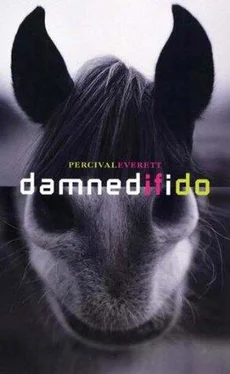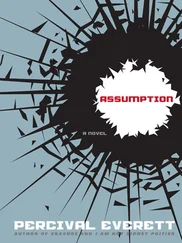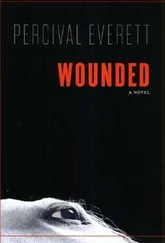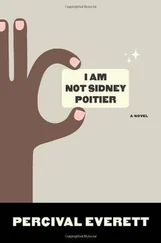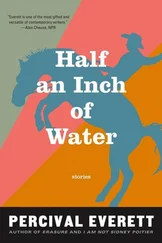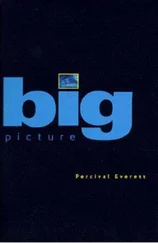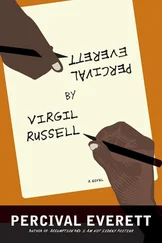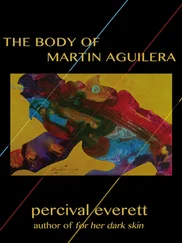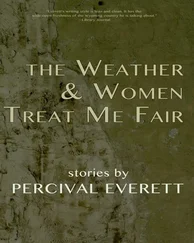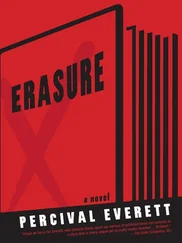Harry got to the door, that familiar institutional door, the kind he had run to at the end of the day in grade school, the kind he had opened for his mother after his father was pronouced dead at Jackson Memorial, the kind they have at the DMV and the sports arena, the kind that you can always open from the inside by pressing the long bar. He opened the door to the chilly air, but he didn’t pause to let it intoxicate him, he pushed on, letting the door quietly to, and then ran across the circular drive lined with empty parking slots and down the walk to the street. Now his heart was racing, his slippers not thick enough to quiet the sting of the asphalt as he sprinted across the street. His breath was gone and though he hadn’t run very far, he could run no farther and he sat on the first stoop he found and stared back at the facility from which he had just escaped.
Harry watched as an ambulance rolled through the circular drive, lights flashing but without a siren, up to the door of the hospital and he wondered if he had perhaps killed the hairy orderly. A couple of police cars followed, with lights and also no sirens, but Harry made no move to his feet, just looked on as car doors opened and slammed shut and people ran into the building.
“Hell of a lot of commotion,” a deep voice came from the door behind him.
Harry looked back and saw a smallish man with gray hair and a gray beard and dark glasses standing behind the screen. “I guess.”
“Some loon probably tried to hang himself with dental floss or something,” the man said.
“I hope you don’t mind me sitting on your stoop.”
“Are you a robber?”
“No, sir.”
“Then I don’t mind.” The man tilted his head slightly. “Can you tell me what’s going on over there?”
Harry didn’t understand the question. How was he to know what was happening over there? Then it dawned on him that the man had maybe seen him escaping. “I don’t know.”
“Just tell me what you’re seeing.”
Harry studied the man, the way he seemed to stare at nothing, the way he tilted his head, and Harry came to the determination that the man was blind. “Well, there’s an ambulance from Mercy Hospital and a couple of cop cars. The lights are flashing and sweeping the grounds and the empty parking lot with red and blue.”
“Thank you. You did that very nicely.”
Harry stood up, keeping his eye on the people gathered in front of the hospital and said, “Well, I guess I’d better keep moving. And thanks for the use of your stoop.”
“Good night,” the old man said and then he closed the door.
Harry glanced back and saw the stretcher being brought out with the orderly laid out on it, his face uncovered and leading Harry to believe that the man was still alive, though from a hundred yards he looked none too good. As he stepped away from the stoop he looked back and saw that there was space under the steps, a space big enough for him to crawl into, a place to hide, to sleep. He thought the police would be looking for him soon and that the last place they would search would be across the street from the hospital. He got down on the ground and squeezed into the space, tried to fold himself into as small a ball as possible, trying to use his own body heat to get warm, rubbing his arms and legs. He closed his eyes and knew that the dream would continue, knew that he couldn’t stop it.

People are just naturally hopeful, a term my grandfather used to tell me was more than occasionally interchangeable with stupid. So hopeful were people attempting to tame the arid plains of the West they believed that rainfall would be divinely moved to increase with their coming, that rain followed the plow. Law was at one time you had to plant one quarter of your section in timber, the thinking being that trees increased rainfall. Of course the timber stands did nothing to make the land wetter and served mainly to provide activity for settlers when crops would not grow, that being clearing fallen trees, the steady, powerful wind being the only predictable meteorological event of the great basin and plains.
Indians accepted the natural condition of things and so were nomadic, going to where water, food, and agreeable climate promised to be. The settlers, refining and reaffirming the American character, preferred to sit in one place and wait for nature to change. To sit still for so long required food. To raise food, they needed land. Since 160 acres of Western land could support only five cows, they needed more land. More land, more cows. More cows, more money. More money, more land. More land by hook or crook, usually by adhering to the letter and not the spirit of the law. More land, more cows, more people, no water.
There I was, driving through southern Utah, as dry as it was a hundred years ago, but having benefited from the ambitious efforts of polygamists to irrigate anything flat. A remarkable job, but canals and ditches don’t make water. And if you pump it out of the ground faster than it fills, then the aquifer soon becomes almost empty, or as the hopeful like to say, “not very full at all.” I’d driven from Colorado to do some contract work for the Utah Department of Agriculture and the Fish and Game Commission, to perform flow-projection analyses on a couple of creeks. For all the anxiety over water and too little water and no water, all the complaining and worrying, not many people want to be hydrologists.
In order to carry out my first business at the confluence of Talbert and Rocky creeks I had to get the signature of a woman named Emma Bickers for permission to cross her property to get to where I needed to be. The woman lived at the bottom of the mountain in the town of Dotson. She had been sent the form requesting her signature by Fish and Game, but it had been mailed back unsigned. To save time, I would ask her to sign the form and then finish my work in hopefully two days.

I pulled into a gas station and stepped out to fill my tanks. A skinny fellow with wild red hair watched me from the diesel pump and folded a stick of gum into his mouth. The afternoon sun was bright but the air was pretty cold, the wind steady.
“You ain’t from around here,” he said.
“Pretty good,” I said. “Was it my Colorado tags or the fact that you’ve never seen me before that tipped you off?” I put the nozzle into my front tank.
“Nice truck,” he said.
“Thanks, I like it.” He didn’t say anything. I moved to my rear tank and continued to pump gas. “Maybe you could tell me where Red Clay Road is.”
“Keep on out this road here, past the motel, past the Sears catalog store, two streets on the left.” He folded another stick of gum into his mouth. “What you want over there?”
“Nothing. I was just wondering where it was. Such a pretty name for a road. Red Clay.”
“You’re a funny guy.”
“That’s me.” I finished with the gas, replaced the nozzle, and then gave him thirty-five dollars. “Gas is high around here.”
“Always going up.”
“Well, thanks.” I climbed in behind the wheel and he walked to my window. “What is it?” I asked.
“Yeah, this is a nice truck.”
I nodded, started my engine, and drove away.
Dotson was a small town without threat of becoming a city. The nearby molybdenum mine that had spurred the growth of the town, had died and taken the downtown and all promise of prosperity with it. The main drag was now a row of boarded-up storefronts, but it was close. For reasons too familiar and too tiresome to discuss, I was a great source of interest as I idled at the town’s only traffic signal. I followed the gas-station man’s directions to Red Clay Road and turned the only way I could.
Читать дальше
